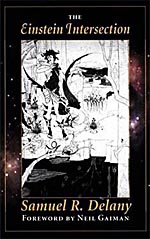
![]() Tar Daddoo
Tar Daddoo
10/28/2014
![]()
The Einstein Intersection is a very short novel that I found difficult to fully understand. My copy of the book has a Foreword by Neil Gaiman that I am anxious to read in hopes that it can shed light on what the book is really about. For now, however, I am denying myself that pleasure so that my thoughts here are still my own.
What is the Science Fiction Premise?
The premise of The Einstein Intersection is that the Earth was abandoned by humans a long, long time ago. We are learning about an alien species that has taken over Earth by copying the attributes of humans as understood from any records that remain behind. This includes following a somewhat inexact form of genetic reproduction and reading many of the written and computer records.
Is the science of the premise explored?
One of the things that makes the novel so difficult is that there is no guru to explain what's going on. We learn about it slowly over the course of the story. This is not so bad when things do get explained, but there are many details left hanging. We see the world the aliens have taken upon themselves and we can compare it to what we know of Earth, but we never really learn how it's all possible.
Is the impact of the premise on an individual explored?
The book is a first person account of one alien's effort to live in this world. It is a bit of an Odyssey, wandering from situation to situation. It is difficult to sort out how much this character is being affected by the Science Fiction Premise and how much he is just discovering what it is.
Is the impact of the premise on society explored?
Insofar as I can understand the book, it seems to be primarily about how the adoption of human attributes has influenced the aliens. This is probably the most interesting aspect of the book. It is difficult to say more without spoiling the book.
How well written is the story?
The prose per se is relatively fluid. My copy of the book has many typos, but they are only a nuisance.
The author includes passages of text at the beginning of each chapter (though they are not actually identified as chapters.) Sometimes these passages seem useful, but more often they are simply difficult to read and understand. I found them annoying. Now that I have finished the book, I am wondering whether they might make more sense on a second read.
The author includes passages of text that appear to come from the author's own journal while writing the book. I found this breach of the Fourth Wall irritating. I continue to wonder why the author did this.
Can I recommend the book?
Given how much I struggled to understand this book, I'm happy it was so short (130 pp.) I rarely abandon a book, but it would have been irritating to remain so confused for twice the length.
If you read Science Fiction for the adventure, you probably should skip this book. It has an adventure, but that's not what the book is about.
If you read Science Fiction for the science, you will find this book annoying. Very little of the science in the book is actually explained. Again, the author does not seem very interested in how his premise is even possible.
If you just like a good story, I think you'll be disappointed. The story is loose and wandering.
The book is really about the author's interest in human myths and how they might influence an alien culture. This is what continues to haunt me about the book and might even induce me to read it again sometime.